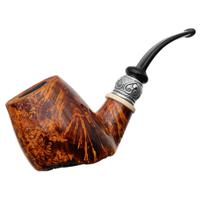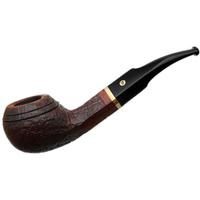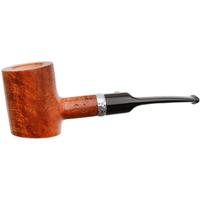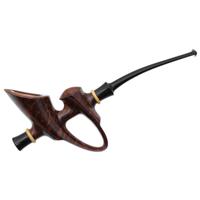There's obviously much to be said for years of hard-won experience and skill. Most of the people considered masters earned that reputation over time.
The (potential) downsides are a loss of enthusiasm, a dearth of new ideas/tendency to repeat yourself, a --perhaps not-conscious-- growing predilection to coast a bit and do some laurel-resting. When you know you can sell every pipe you make, your best effort or not, for a not inconsiderable sum, it would take a better man than I not to occasionally say "screw it" and not pay quite as much attention to minor details that most people wouldn't notice.
Conversely, think about the first novels or albums produced by writers or musicians that they never surpassed or even equaled. Plus if I were a budding pipe maker making my debut at a major show, I'd spend a ridiculously excessive amount of time on every pipe I carved and make twenty for every one that I wound up choosing to represent me, the monetary return on my invested time be damned.
All this rumination was prompted by a very early (first year, I think) pipe I have from a maker that I like more than any other I've seen from him/her over the ensuing seventeen years (their pipes have since become much sought after).
That's subjective, of course, and doubtless some would prefer the later work and it may also have improved technically - although mine is as faultless a pipe as I own. In any case, that's what set me cogitating.
Any thoughts?
The (potential) downsides are a loss of enthusiasm, a dearth of new ideas/tendency to repeat yourself, a --perhaps not-conscious-- growing predilection to coast a bit and do some laurel-resting. When you know you can sell every pipe you make, your best effort or not, for a not inconsiderable sum, it would take a better man than I not to occasionally say "screw it" and not pay quite as much attention to minor details that most people wouldn't notice.
Conversely, think about the first novels or albums produced by writers or musicians that they never surpassed or even equaled. Plus if I were a budding pipe maker making my debut at a major show, I'd spend a ridiculously excessive amount of time on every pipe I carved and make twenty for every one that I wound up choosing to represent me, the monetary return on my invested time be damned.
All this rumination was prompted by a very early (first year, I think) pipe I have from a maker that I like more than any other I've seen from him/her over the ensuing seventeen years (their pipes have since become much sought after).
That's subjective, of course, and doubtless some would prefer the later work and it may also have improved technically - although mine is as faultless a pipe as I own. In any case, that's what set me cogitating.
Any thoughts?
Last edited:













